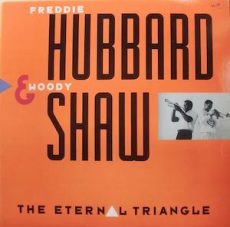
Requisites
The Eternal Triangle ~ Freddie Hubbard and Woody Shaw | By Eddie Carter
Freddie Hubbard and Woody Shaw enter this morning’s spotlight with a superb 1987 sextet album, The Eternal Triangle (Blue Note B1-48017). I’m a long-time fan of both trumpet players and have been listening to their albums recently. The Eternal Triangle is their second collaboration after Double Take, recorded and released two years earlier. Freddie is heard on the left channel, and Woody is heard on the right channel. Returning from the earlier session are Kenny Garrett on alto sax, Mulgrew Miller on piano and Carl Allen on drums. Ray Drummond takes over on bass for this date. My copy is the original U.S. Stereo release.
Down Under by Freddie Hubbard starts Side One with the rhythm section’s infectious introduction to the sextet’s danceable theme. Freddie kicks off the opening line with a strong tone. Mulgrew continues the effortless swing in the following reading. Woody makes quick work of the third solo, and then Kenny has a fine spot ahead of the ensemble’s return that fades out slowly. The Eternal Triangle by Sonny Stitt comes at you fast and furious from the sextet’s rapid-fire melody. Hubbard takes us for a high-speed ride first, and then Garrett heats things up in the second statement. Shaw steps up next for an aggressive reading. Miller gives a spirited presentation, and Carl ends the solos with a brisk workout into the reprise and quick stop.
The Moontrane by Woody Shaw takes off with him leading the ensemble in a lively melody. Woody is the first soloist, and he comes out swinging. Kenny gives a brisk reading in the second spot. Freddie adds a bit more fuel to the fire in the following statement, and Mulgrew leads us to a swinging conclusion with an inspired interpretation. Side Two gets underway with the sextet keeping its foot on the gas for Calling Miss Khadija by Lee Morgan. It begins with the rhythm section’s introduction; then, the front line joins in for the melody. Shaw ignites the song’s first brightly burning flame. Miller whets our appetite further in the second statement, and then Hubbard has a few memorable moments next. Garrett comes in to give a sizzling solo, and Carl gets the last word in a vigorous finale before the ensemble returns.
I first heard Freddie Hubbard’s Nostrand and Fulton on an earlier album, Here To Stay. The song’s title comes from a Brooklyn intersection, and the sextet begins the melody vibrantly. Freddie dives into the opening solo and wails, then Kenny follows with some heated sax play. Woody tackles the next reading with passionate fire, and Mulgrew closes with a very enthusiastic statement ahead of the theme’s reprise and conclusion. Tomorrow’s Destiny by Woody Shaw is off to the races from the sextet’s opening chorus. Miller is up first with a solo of high-spirited delight. Shaw goes to work next on a swift reading, then comes Hubbard’s exhilarating statement. Garrett builds the song’s final interpretation into an impressive conclusion preceding the ensemble’s ending theme and exit.
Michael Cuscuna and Don Sickler produced The Eternal Triangle. The recording engineer was Rudy Van Gelder. It is a full digital recording that emerges from your speakers with a stunning soundstage. The musicians are transported to your listening room with excellent fidelity. The pressing is also quite good, and the record is noticeably quiet until the music starts. If you are a fan of Freddie Hubbard and Woody Shaw, I hope you will consider The Eternal Triangle on your next record shopping trip. In my opinion, it’s one of the best albums in both musician’s discographies and a terrific release worthy of a spot in any jazz lover’s library!
~ Double Take (Blue Note BT-85121), Here To Stay (Blue Note BST-84135) – Source: Discogs.com © 2024 by Edward Thomas Carter For the serious collector of jazz… #Jazz #Classic #Collectible #Music #Notorious
More Posts: choice,classic,collectible,collector,history,instrumental,jazz,music,trumpet

